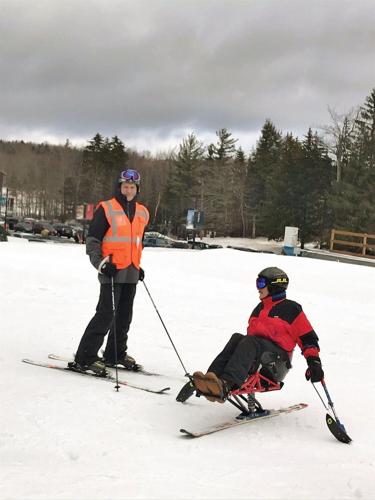DEERFIELD VALLEY — Dr. Rick Linnehan compares space suits to medieval armor.
"You've got a big fish bowl over your head and you're wearing roller skates to move around, you've got boxing gloves on, you've got a pair of lobster tongs and they're telling you to go out and change your spark plugs in the dark," the astronaut said to laughs during a presentation called "Adapting to Challenges: What We Learn from Space Exploration" at the Old School Community Center in Wilmington on Saturday.
Linnehan traveled last week from Houston where he lives to meet with Adaptive Sports at Mount Snow in West Dover, a volunteer nonprofit helping individuals with disabilities develop skills while skiing, snowboarding and more.
"Dr. Linnehan has challenged himself and defied the odds and pushed existing boundaries to achieve greatness in many aspects of his life. He is inspirational and relatable to our adaptive skiers, riders and volunteers," Pam Greene, executive director of Adaptive Sports at Mount Snow, said in a statement. "During his time with our students and volunteers, we expect he will be able to empathize with the challenges and adaptations we make for our students so they can participate in skiing, snowboarding and other sports."
Linnehan said he has wanted to visit Adaptive Sports for years. He called it "a great cause."
For Linnehan, training has been the biggest challenge of his career as an astronaut. He estimated preparing for each mission takes about a year to a year and half.
"If 10 percent of the time something went the way it was supposed to go, you were lucky," he said. "Because nothing went the way it was supposed to go. So the training came in super helpful."
Before joining the National Aeronautics and Space Administration, Linnehan went to veterinary school. He said the first astronauts were not humans but rodents, chimpanzees and monkeys.
During his 27 years as an astronaut, Linnehan spent 58 days in space and logged more than 42 hours of space walks, according to a news release.
His last mission, STS-123, occurred in 2008. He served as one of the mission specialists. He helped add components to the International Space Station including a robotics system called Dextre.
Sleeping in space, Linnehan said, is "not easy." He shared photographs of astronauts wearing light shields over their eyes and ear plugs while their bodies were strapped down. He said a lot of sleep medications are taken during the first few nights in space.
By his count, astronauts spend about 16 to 17 hours a day working on different projects.
"You're exhausted by the end of the mission," he said.
His hope is that Mars will someday by colonized by humans on Earth. He said the planet is two-thirds the size of ours and likely would require living in shelters underground to protect from radiation.
Linnehan believes there will be a lot of astronauts to come, with billionaires now bringing forward their own space ambitions.
"With what's happening now with SpaceX and Blue Origin," he said referring respectively to projects from Elon Musk and Jeff Bezos, "they're going to be the ones I think who lead that charge to get to the moon and maybe colonize Mars."
He said he would not be surprised if people were living on Mars in 50 years.
Linnehan called it "a huge mistake" to retire the Space Shuttle in 2010.
"Sorry President Bush," he said, referring to George W. Bush. "Because you know once you give away capability like that, you're not going to get it back and we haven't gotten it back. So we're paying the Russians now anywhere from $80 million to $100 million for a seat to get up to our own space station that we built and paid for, and we pay the Russians for the vehicles on top of paying for the seats."
Linnehan said politics tend to change from presidential administration to administration, which makes it difficult to plan for the long term as required for space projects. He sees NASA having more of a think tank role in the future, helping to identify the right people for jobs.
During a lunch at the Grand Summit Hotel at the ski resort Saturday afternoon, Linnehan suggested aspiring astronauts study different kinds of sciences, conduct research and obtain advanced degrees.
"But do it because you love it and you're interested in it, and just apply when the time comes along," he said. "And it doesn't hurt, the way things are going, if you have a private pilot's license or you jump out of airplanes or you're a scuba diver or you're a mountain climber. It helps to be involved in outside, kind of weird activities. All that means is be a well-rounded person. I mean I'm a nerd. Be a nerd but be a well-rounded person."
Reach staff writer Chris Mays at cmays@reformer.com, at @CMaysBR on Twitter and 802-254-2311, ext. 273.







